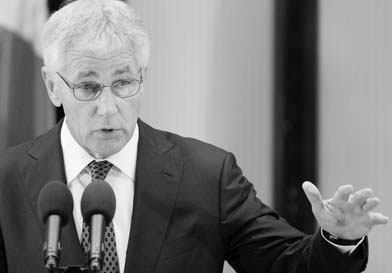US boosts troops in Philippines amid South China Sea tension
|
US Defense Secretary Chuck Hagel answers why the US is increasing its military presence in the Philippines during his visit on Friday in Manila. Aaron Favila / Associated Press |
The United States has accelerated expansion of its military presence in the Asia-Pacific, as its defense chief on Friday reaffirmed the progress Washington and Manila have made to allow a bigger US military footprint in the Philippines.
Chuck Hagel held talks on increasing rotational presence by US troops in the Southeast Asian country with President Benigno Aquino III amid Manila's tensions with Beijing over the South China Sea, AFP reported.
Analysts warned, however, that the Philippines risks losing part of its sovereignty by agreeing to expand the US military presence in the country, while Washington is sending a dangerous signal to the region that it supports the Philippines' claims on the South China Sea disputes.
It may be "a strategic mistake by Manila to invite the US troops back to the country," said Wu Shicun, director of the National Institute for South China Sea Studies.
On Wednesday, the Philippines' Chief of Staff General Emmanuel Bautista said that its military will stick to a "no confrontation" policy even as it strengthens its forces with more weapons and looks forward to a larger US military presence in the country.
China's Ministry of National Defense said that the country firmly opposes any measures that will complicate or escalate the situation in the South China Sea.
Wu said that there's already internal criticism on Manila's decision to play up the South China Sea dispute.
"Inviting more US troops back in the country will trigger more domestic pressure for Aquino," he added.
Ahead of Hagel's visit, a large number of protesters rallied in front of the US embassy in Manila on Thursday, saying the continuing US military deployment will further heighten tensions in the region, Press TV reported.
To avoid angering local people, whose Senate voted out the US amid anti-US sentiment two decades ago, Hagel said that Washington would not seek permanent outposts.
The US has recently increased its annual military aid to the Philippines from $30 million to $50 million, which marks the highest level since 2000.
Washington also increased the frequency of joint exercises with the Philippines and with other countries in the region in recent years.
These actions are all in line with Washington's Asia-rebalancing strategy and help it add more military presence, said Xu Liping, a researcher on Asia-Pacific studies at the Chinese Academy of Social Sciences.
"Aiming for more space in bargaining with China on the South China Sea disputes, Manila has shown more support on increasing US military presence in the country recently," Xu said. "But the support won't last, since the majority of local people still have bad memories of US troops in the country."
The US and the Philippines began negotiations on expanding rotating US military's presence on Aug 15, and the proposal would allow more US troops, aircraft and ships to temporarily pass through the Philippines.
He Liu contributed to the story.
zhouwa@chinadaily.com.cn



















